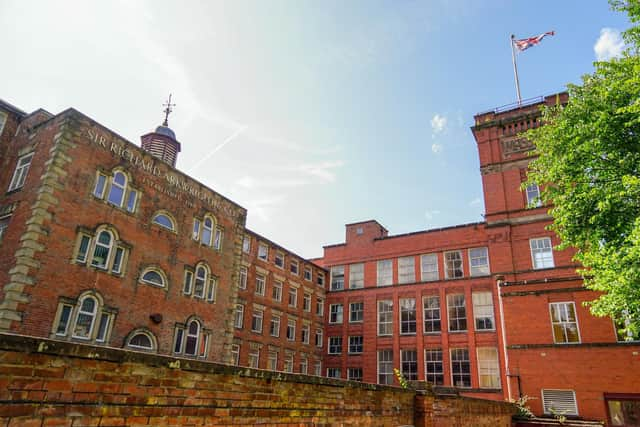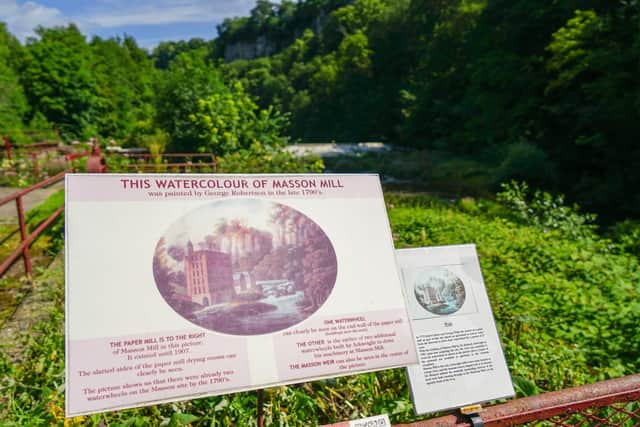New owner of world famous Derwent Valley complex - one of Derbyshire’s most historically important mills - talks "big responsibility"
and live on Freeview channel 276
As reported earlier this year, Derwent Hydroelectric Power Limited bought up Masson Mills, between Matlock Bath and Cromford, with a promise to “increase public enjoyment and appreciation of the Mill for both visitors to the area and local residents.”
It has taken a few months to get the doors open again and welcome the public back to the museum which occupies part of the complex, but that is just the first step of the company’s ambitions.
Advertisement
Hide AdAdvertisement
Hide AdJamie Needle, 42, one three brothers now in charge of their father’s family firm, said: “Historically the business has always reinvested the majority of its money in building new hydro power schemes, or buying existing ones. That’s what we believe in and it’s more or less all we’ve ever done.


“But we wanted to do something different, with more diverse activities, and Masson was an opportunity to do both at the same time. We also just really like it here, and enjoy being in the building. We’ve been involved here since the 1990s, helping the former owner to generate electricity, and it’s something we’d talked about for a long time. It’s lovely to walk around the place, and it feels exciting to start a new chapter for the property.
He added: “It’s a big responsibility and not something we take on lightly. Our business started down in Milford, then expanded to Belper, so we have a fair idea what we’re taking on with the World Heritage Site status, and working alongside that team to do everything the right way – but this is on another scale altogether.
“There’s a lot of untapped potential. On an objective, physical level there are a lot of big empty rooms to fill. Whatever we do with that space in future, we have to get it right. It’s not going to be a trial-and-error approach, we’re taking advice from lots of different people.”
Advertisement
Hide AdAdvertisement
Hide AdJamie’s primary responsibility in the business is usually legal and financial, while brothers Dean and Simon lead on technical operations, but their new venture adds social and cultural considerations to the mix.


The company has taken on an in-house surveyor, the two staff who remained from the previous ownership and a couple of other new faces to man the site and greet curious visitors throughout the week, but staff from across the business are pitching in to help manage the flow of visitors, with some daily tours already selling out.
Jamie said: “There’s a lot to learn but that’s one of the key things I’ve always enjoyed in my work, finding new ways to develop a business. Owning the mills feels like a big thing, but I wouldn’t say we were daunted. It’s something we all felt we wanted to get involved in.
“There are lots of little challenges but the biggest one we’re looking forward to is coming up with something that’s going to fulfil all the different criteria that people want from the site. It’s not like buying an old house and doing it up, where only you have to live in it and most other people won’t mind what you do. The mills matter to a lot more people.
Advertisement
Hide AdAdvertisement
Hide Ad“Here there’s a real feeling of community ownership, even if that’s not literally the case. We’ve seen the reaction online since we announced the takeover and it’s been really nice. People seem pleased it’s been taken on by a group with local roots and an inherent interest in the mills.


“We’ll have to balance all the different views while ultimately finding a way to give the place a sustainable long-term future, both in terms of finance and the environment.”
Having moved in the company’s offices, reopened the museum with its cacophony of engineering marvels and remodelled the visitor centre entrance with a café area and souvenir shop, the next job on the list will be refurbishing the rooms used to host conferences and other events.
There have been a few other minor construction tasks along the way but otherwise the Needles have found their stack of bricks in reassuringly good condition for its 240 year.
Advertisement
Hide AdAdvertisement
Hide AdEven the hydroelectric turbines are still going strong after almost a century, though there will be some short-term upgrades to the circuitry to maximise efficiency and the returns from selling excess electricity to the national grid.
From here on, the company has little set in stone, other than a desire to make the mills a beating heart of the community once again.
Jamie said: “I want to introduce some more uses that are publicly accessible. I think there are lot of people visiting the area who would want to visit the mills, and not all of them will only be interested in the textile history.
“Phase one was always about getting the museum and car park properly open again, and taking a few months to understand the place better. We’re at the point now where we can say that’s done, and start working out what to do with the rest of it. The immediate job is the thinking before the doing.”
Advertisement
Hide AdAdvertisement
Hide AdFor future updates on the project, follow the Masson Mills page on Facebook. See massonmills.co.uk for more visitor information.